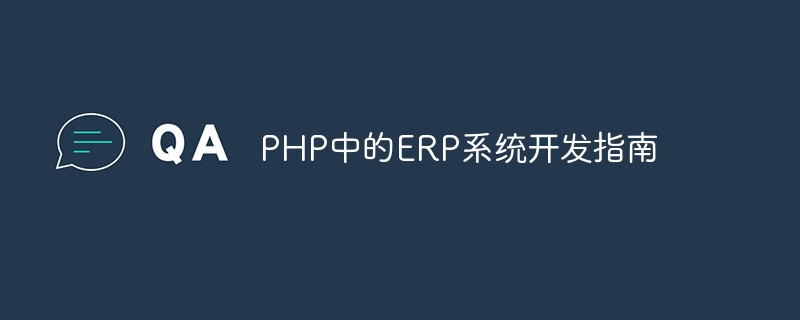With the increasing popularity of web applications, security auditing has become more and more important. PHP is a widely used programming language and the basis for many web applications. This article will introduce security auditing guidelines in PHP to help developers write more secure web applications.
- Input validation
Input validation is one of the most basic security features in web applications. Although PHP provides many built-in functions to filter and validate input, these functions do not fully guarantee the security of the input. Therefore, developers need to write their own input validation code to ensure that the input does not contain malicious characters or codes.
When writing input validation code, you should consider the following points:
- Validate the length, format, and type of input.
- Use regular expressions and filters to filter input.
- For database-related input, prepared statements should be used to prevent SQL injection attacks.
- Prevent cross-site scripting attacks (XSS)
XSS attacks refer to malicious users entering malicious scripts or codes on Web pages to steal user information, Destroy the website or engage in other malicious activity. In PHP, XSS attacks can be prevented by:
- Escape user input.
- Perform HTML filtering on user input.
- It is forbidden to use the eval() function.
- Prevent SQL injection attacks
SQL injection attacks refer to attackers entering malicious SQL code into a web application to obtain sensitive information in the application. information or conduct other malicious activities. In PHP, SQL injection attacks can be prevented by:
- Using PDO or MySQLi extensions.
- Filter the input data.
- Use prepared statements.
- Prevent file inclusion attacks
File inclusion attacks refer to attackers including malicious files in web applications to execute malicious code and gain access to the application sensitive information in. In PHP, file inclusion attacks can be prevented by:
- Do not use dynamic file inclusion.
- Perform path verification on included files.
- Disable allow_url_include configuration option.
- Prevent session attacks
A session attack occurs when an attacker steals a user's session ID to impersonate the user and access sensitive information in the application. In PHP, session attacks can be prevented by:
- Using HTTPS encryption to transmit the session ID.
- A new session ID should be generated every time a user logs in.
- Use session expiration time.
- Preventing file upload attacks
File upload attacks refer to attackers uploading files containing malicious code by forging file types and file names. In PHP, file upload attacks can be prevented by:
- Type and size verification of uploaded files.
- Store uploaded files in a non-web root directory to prevent direct access.
- Use the rename() function to rename the uploaded file.
- Prevent HTTP response splitting attacks
An HTTP response splitting attack refers to an attacker stealing user information by injecting HTTP responses with malicious content Or break web applications. In PHP, HTTP response splitting attacks can be prevented by:
- Escape the output.
- Do not use the header() function to pass HTTP headers.
- Disable the magic_quotes_gpc configuration option.
Summary:
This article introduces the security audit guide in PHP, including input validation, preventing cross-site scripting attacks, preventing SQL injection attacks, preventing file inclusion attacks, and preventing session attacks. , prevent file upload attacks and prevent HTTP response splitting attacks. Developers should be aware of these security issues and write secure web applications against them.
The above is the detailed content of Security Auditing Guide in PHP. For more information, please follow other related articles on the PHP Chinese website!
 在Go语言中使用Elastic Stack:完整指南Jun 17, 2023 am 10:42 AM
在Go语言中使用Elastic Stack:完整指南Jun 17, 2023 am 10:42 AM在Go语言中使用ElasticStack:完整指南ElasticStack是一个开源工具集,它为搜索、分析和可视化大量数据提供了强大的支持。该工具集由四个主要组件组成:Elasticsearch、Logstash、Kibana和Beats。其中,Elasticsearch是一个分布式的搜索和分析引擎,能够快速地执行搜索、分析和聚合操作。Logstash是
 在Go语言中使用AWS S3:完整指南Jun 17, 2023 am 08:21 AM
在Go语言中使用AWS S3:完整指南Jun 17, 2023 am 08:21 AM近年来,随着云计算技术的发展,许多企业开始转向使用云存储服务来存储和管理自己的数据。其中,AWSS3(AmazonWebServicesSimpleStorageService)是一种备受欢迎的选择。作为AWS的核心服务之一,S3提供了高可用性、高性能、可扩展和安全的存储服务。在这篇文章中,我们将深入探讨如何在Go语言中使用AWSS3。安装AW
 PHP中的安全审计指南Jun 11, 2023 pm 02:59 PM
PHP中的安全审计指南Jun 11, 2023 pm 02:59 PM随着Web应用程序的日益普及,安全审计也变得越来越重要。PHP是一种广泛使用的编程语言,也是很多Web应用程序的基础。本文将介绍PHP中的安全审计指南,以帮助开发人员编写更加安全的Web应用程序。输入验证输入验证是Web应用程序中最基本的安全特性之一。虽然PHP提供了许多内置函数来对输入进行过滤和验证,但这些函数并不能完全保证输入的安全性。因此,开发人员需要
 在Go语言中使用AWS SDK:完整指南Jun 17, 2023 am 09:40 AM
在Go语言中使用AWS SDK:完整指南Jun 17, 2023 am 09:40 AMAWS(AmazonWebServices)是一家全球领先的云计算提供商,为企业和个人提供各种云计算服务。随着云计算技术的发展,越来越多的开发者开始使用AWS来进行开发、测试和部署他们的应用程序。Go语言是一门非常流行的编程语言,尤其适合构建高性能和可扩展的云原生应用程序。AWS提供了适用于Go语言的SDK(SoftwareDevelopmentKi
 PHP中的ERP系统开发指南May 21, 2023 am 08:22 AM
PHP中的ERP系统开发指南May 21, 2023 am 08:22 AM随着现代企业的发展,ERP系统的重要性也越来越凸显出来。ERP系统可以帮助企业集成和管理计划、客户关系、供应链、人力资源等方面的数据和业务流程。PHP作为一种流行的编程语言,也可以用于开发ERP系统。在本文中,我们将分享一些PHP中的ERP系统开发指南。确定ERP系统的需求在开始开发ERP系统之前,您需要确定自己的ERP系统所需要的功能。根据你的企业的运营方
![如何使用 wmic 快速列出所有 Windows 进程 [教程]](https://img.php.cn/upload/article/000/887/227/168569000461539.jpg) 如何使用 wmic 快速列出所有 Windows 进程 [教程]Jun 02, 2023 pm 03:13 PM
如何使用 wmic 快速列出所有 Windows 进程 [教程]Jun 02, 2023 pm 03:13 PM当您在处理各种重要项目并且性能是关键字时,必须准确了解后台运行的进程。特别是如果上述一个或多个过程影响您当前的工作,或者您可以只使用额外的果汁。准确地找出您的设备仍在后台运行的内容非常容易。您可以使用wmic工具在几秒钟内获得所需的所有信息。怎么样,你问?我们将在本文中向您展示这一点,因此您可以方便地获得这些信息以供将来参考。如何使用wmic了解后台进程?实际上,您可以在命令提示符窗口中输入许多有用的命令,前提是您以管理员权限打开它,这些命令可以提供宝贵的信息。了解后台进程以及收集系统信息(BI
 PHP中的音频操作指南May 20, 2023 pm 09:42 PM
PHP中的音频操作指南May 20, 2023 pm 09:42 PMPHP作为一种广泛使用的服务器端语言,在许多Web应用程序中扮演着重要的角色。音频处理是一个很常见的需求,例如音乐网站和音频产品销售网站等。在本文中,将为读者介绍如何在PHP中操作音频文件。一、了解音频格式在PHP中操作音频文件前,需要先了解音频文件格式。常见的音频格式有MP3、WAV、OGG、FLAC等。不同的格式有不同的音频编码算法和数据格式。例如,MP
 在Go语言中使用AWS IAM:完整指南Jun 17, 2023 pm 03:39 PM
在Go语言中使用AWS IAM:完整指南Jun 17, 2023 pm 03:39 PMAWS(AmazonWebServices)作为云计算业界的领头羊,提供了方便而强大的云计算服务,使得企业可以轻松地构建和管理自己的IT基础设施,并获得更好的可扩展性、灵活性和低成本。而IAM(IdentityandAccessManagement)是AWS中的重要服务之一,负责管理用户(包括人员、应用、服务等)的身份和访问权限,保障AWS资源的安


Hot AI Tools

Undresser.AI Undress
AI-powered app for creating realistic nude photos

AI Clothes Remover
Online AI tool for removing clothes from photos.

Undress AI Tool
Undress images for free

Clothoff.io
AI clothes remover

AI Hentai Generator
Generate AI Hentai for free.

Hot Article

Hot Tools

SublimeText3 English version
Recommended: Win version, supports code prompts!

Safe Exam Browser
Safe Exam Browser is a secure browser environment for taking online exams securely. This software turns any computer into a secure workstation. It controls access to any utility and prevents students from using unauthorized resources.

Zend Studio 13.0.1
Powerful PHP integrated development environment

DVWA
Damn Vulnerable Web App (DVWA) is a PHP/MySQL web application that is very vulnerable. Its main goals are to be an aid for security professionals to test their skills and tools in a legal environment, to help web developers better understand the process of securing web applications, and to help teachers/students teach/learn in a classroom environment Web application security. The goal of DVWA is to practice some of the most common web vulnerabilities through a simple and straightforward interface, with varying degrees of difficulty. Please note that this software

mPDF
mPDF is a PHP library that can generate PDF files from UTF-8 encoded HTML. The original author, Ian Back, wrote mPDF to output PDF files "on the fly" from his website and handle different languages. It is slower than original scripts like HTML2FPDF and produces larger files when using Unicode fonts, but supports CSS styles etc. and has a lot of enhancements. Supports almost all languages, including RTL (Arabic and Hebrew) and CJK (Chinese, Japanese and Korean). Supports nested block-level elements (such as P, DIV),






